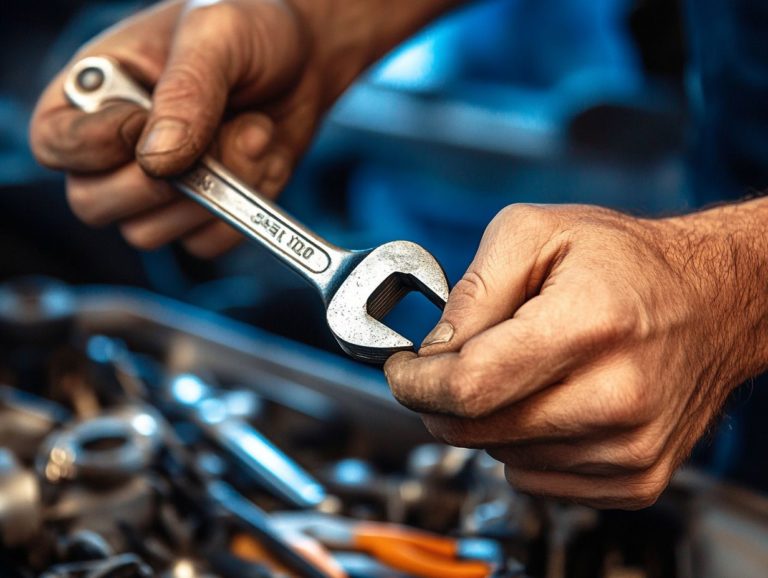5 Common Signs of Transmission Failure
Your vehicle’s transmission is essential for a seamless driving experience. When it begins to falter, the result can be both frustrating and financially burdensome.
Here are five common signs that may indicate transmission failure, ranging from gears that don’t stay in place to unusual noises suggesting something is amiss. This discussion will cover the causes and types of transmission failure, explore prevention strategies, and debunk prevalent myths.
You ll learn how to recognize when your transmission requires repair and uncover potential solutions. Staying informed is the key to ensuring your ride remains in optimal condition.
Contents
- Key Takeaways:
- 1. Transmission Slipping
- 2. Strange Noises
- 3. Delayed Engagement
- 4. Leaking Fluid
- 5. Check Engine Light
- What Causes Transmission Failure?
- How Can Transmission Failure Be Prevented?
- What Are the Common Myths About Transmission Failure?
- How Can One Identify If Their Transmission Needs Repair?
- What Are the Possible Solutions for Transmission Failure?
- Frequently Asked Questions
- 1. What are the 5 common signs of transmission failure?
- 2. How do I know if my transmission is slipping?
- 3. What could be causing a burning smell from my transmission?
- 4. Are strange noises coming from my transmission a cause for concern?
- 5. What should I do if I notice fluid leaking from my transmission?
- 6. Can a dashboard warning light indicate transmission failure?
Key Takeaways:

- Transmission slipping is a warning sign of potential transmission failure and should not be ignored.
- Strange noises, such as grinding or whining, can indicate a problem with the transmission and should be addressed immediately.
- Delayed engagement, where the car takes a while to shift into gear, can be a sign of transmission failure and should be checked by a professional.
1. Transmission Slipping
Watch out for transmission slipping! It can turn driving into a frustrating experience and may even compromise your safety if left unchecked.
If you notice your vehicle experiencing slipping gears or delayed engagement, it’s crucial to understand the symptoms and causes to take appropriate action for your safety. Regular inspections by a qualified mechanic can help resolve these issues before they escalate into transmission failure, especially if your vehicle has already hit the 200,000-mile mark. Being aware of the 5 warning signs of common engine problems is essential, as ignoring those signals might lead to significantly higher repair costs down the road.
Low fluid levels, worn gears, and a lack of regular maintenance are often the main offenders behind transmission slipping. When your transmission fluid runs low, it can result in insufficient lubrication, causing metal components to grind against each other. This not only creates unsettling noises but also accelerates wear and tear. Over time, as gears wear down, they may fail to engage properly, leading to more complex problems.
Being attentive to symptoms like unexpected grinding or shaking during gear shifts is essential; these signs indicate that you need to take immediate action. Prioritizing timely vehicle inspections can save you from the headaches and expenses that come with larger repairs in the future.
2. Strange Noises
Strange noises coming from your vehicle can be a telling sign of underlying transmission issues, such as clunking or grinding, which could jeopardize both its functionality and your safety on the road.
These unsettling sounds often point to a range of problems, from low transmission fluid levels to more serious internal damage. If you hear clunking, it might suggest loose components or worn gears, while grinding could indicate trouble with the clutch or gear engagement. Ignoring these warning signs can lead to more extensive repairs later, potentially leaving you stranded or facing costly damage.
Don’t wait! Get professional help as soon as you hear unusual noises. By doing so, you not only enhance the longevity of your transmission but also ensure the safety of everyone on the road.
3. Delayed Engagement
Experiencing delayed engagement in your vehicle can be a troubling symptom, particularly in automatic transmissions. That lag in gear shifting can create unsafe driving conditions and compromise your vehicle’s performance.
In manual transmissions, you might find yourself facing a noticeable delay when trying to engage a gear, which can be equally frustrating. Several factors could be at play here, such as low transmission fluid levels that impede the systems that help your car shift gears easily, or worn clutch components in manuals that fail to secure a solid connection between the engine and the transmission.
Regular vehicle inspections are essential. They serve as an early warning system, helping you identify these issues before they escalate. By catching problems early, you can ensure timely repairs, ultimately leading to a safer and more reliable driving experience.
4. Leaking Fluid

Leaking fluid is a critical warning sign that signals serious issues with your vehicle’s transmission. Ignoring the loss of transmission fluid could lead to overheating and ultimately transmission failure.
When transmission fluid seeps onto the ground, it s more than just a nuisance; it can severely affect how your vehicle shifts gears and its overall performance. You may struggle to engage gears, experience unexpected slipping, or hear unusual noises that indicate your system is having trouble functioning smoothly. This complicates your driving experience and increases the risk of more extensive damage to the transmission.
That’s why it’s essential to seek immediate inspection by a professional mechanic. A thorough examination of fluid levels and the root causes of the leak will help ensure your vehicle remains reliable, minimizing further complications down the road.
5. Check Engine Light
When the check engine light illuminates on your dashboard, it could indicate a range of issues, including the potential for transmission failure. Investigate the cause promptly to keep your vehicle safe and reliable on the road.
Ignoring this warning might lead to more severe problems later, risking both your safety and your wallet with increased repair costs. The transmission system is vital for transferring power from the engine to the wheels, and any malfunction can disrupt this essential process.
Consult a qualified mechanic for accurate diagnostics to identify the underlying issue. Taking early action not only addresses current problems but also prevents future complications, protecting your investment and ensuring dependable performance when you drive.
What Causes Transmission Failure?
Transmission failure can arise from various factors, such as poor maintenance, low transmission fluid levels, and inevitable wear and tear over time. Understanding these causes can save you from costly repairs and ensure your driving safety.
Low fluid levels can lead to inadequate lubrication, causing components to overheat and potentially seize, putting the functionality of the entire system at risk. Neglecting regular maintenance like fluid changes and inspections might exacerbate existing issues that could go unnoticed until it s too late.
Prioritize routine checks from a professional mechanic to catch early signs of trouble. This proactive approach allows for timely interventions that can save you time and money in the long run. Staying ahead of the game can significantly extend the lifespan of your transmission and enhance your vehicle’s overall performance.
What Are the Different Types of Transmission Failure?
Different types of transmission failure can manifest in various ways, affecting both automatic and manual transmissions. Knowing how to recognize transmission problems is crucial for finding the right solutions.
For example, you might experience slipping gears in either type of transmission, leaving your vehicle suddenly losing power or struggling to maintain speed definitely unsettling for any driver. This often results from worn-out clutch components in manual transmissions or a malfunctioning torque converter (a part that helps your vehicle shift gears smoothly) in automatics.
Another issue is delayed engagement, where you notice a frustrating lag before your vehicle responds when shifting gears. This can indicate low transmission fluid levels or issues with the valve body (the part that controls fluid flow), both of which require your attention.
Lastly, internal component wear, such as damage to bearings or synchronizers, can disrupt the smooth operation of your transmission. You may hear grinding noises during shifts or face difficulty engaging gears, regardless of whether your vehicle has a manual gearbox or an automatic system.
Don t wait schedule your inspection today!
How Can Transmission Failure Be Prevented?

You can prevent transmission failure through regular upkeep, monitoring fluid levels, and timely inspections by a professional mechanic. This proactive approach will help extend the lifespan of your vehicle’s transmission.
By regularly checking your transmission fluid the fluid that helps the car’s transmission work smoothly you can address potential issues before they escalate. Following the manufacturer s recommended vehicle inspection schedule will also help you catch any abnormalities early, significantly reducing the risk of major failures.
Implementing these essential practices enhances your vehicle’s reliability and saves you money in the long run. This way, you can enjoy a smoother driving experience without the worry of unexpected breakdowns.
What Are the Common Myths About Transmission Failure?
Several myths about transmission failure can lead to misunderstandings that may result in costly mistakes regarding repairs and maintenance.
You might think that skipping regular fluid changes will save you money, but this can cause significant wear and tear on your transmission, ultimately shortening its lifespan. Some may also believe that aggressive driving habits won t impact their vehicle s transmission. However, frequent hard braking and rapid acceleration put too much strain on these components.
If you think that immediate repairs aren’t necessary for minor transmission issues, that mindset can lead to bigger problems down the line. Addressing warning signs early is crucial.
By understanding these misconceptions, you can make informed decisions that will protect your investment in your vehicle.
How Can One Identify If Their Transmission Needs Repair?
Identifying whether your transmission needs repair means keeping an eye out for specific symptoms, such as unusual noises, slipping gears (when the car changes gears unexpectedly), and delayed engagement. These signs should prompt you to consult a professional mechanic without delay.
Be aware of other red flags, like grinding sensations while shifting gears, excessive shaking during acceleration, and noticeable fluid leaks beneath your vehicle. It s essential to stay vigilant; these symptoms can lead to more serious damage if not addressed promptly.
By taking action when you notice these issues, you can sidestep costly repairs later and ensure your vehicle remains safe and reliable on the road.
What Are the Possible Solutions for Transmission Failure?
When you encounter transmission failure, a range of solutions awaits, from fluid replacements to complete transmission repairs. It’s essential to have these tasks performed by a professional mechanic to guarantee the best performance for your vehicle.
Minor issues, like low transmission fluid levels or a clogged filter, can often be fixed with simple maintenance. Addressing these can restore your vehicle’s function without significant costs.
However, if you notice serious problems like slipping gears or strange noises be prepared for a potential overhaul, which may require dismantling the transmission for a thorough inspection.
Consulting with a knowledgeable mechanic allows you to navigate these options effectively, ensuring you target the root cause of the issue. This expert insight is invaluable; a rushed decision could lead to more expensive repairs in the future.
Frequently Asked Questions

1. What are the 5 common signs of transmission failure?
- Slipping gears
- Burning smell
- Strange noises
- Leaking fluid
- Dashboard warning lights
Act now! If you notice any issues with your transmission, consult a mechanic immediately to avoid costly repairs.
2. How do I know if my transmission is slipping?
Notice a delay in acceleration or difficulty shifting gears? If RPMs rise without a speed increase, your transmission might be slipping.
3. What could be causing a burning smell from my transmission?
A burning smell signals overheating or low fluid levels. Have a mechanic check it right away to prevent serious damage.
4. Are strange noises coming from my transmission a cause for concern?
Yes! Noises like grinding, whining, or clunking indicate a problem. Get a professional to inspect it promptly.
5. What should I do if I notice fluid leaking from my transmission?
Leaking transmission fluid is a major red flag. This could mean damage to a seal or gasket, so address it immediately!
6. Can a dashboard warning light indicate transmission failure?
Absolutely! Many modern cars have a transmission temperature warning light. Don t ignore it have a mechanic check it if it lights up.






